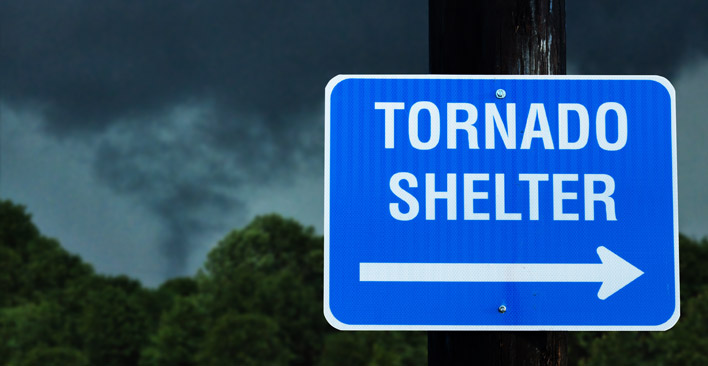Each year, millions of Americans pack their bags and head to unfamiliar destinations. Some are seeking rest, while others are seeking adventure. Some travel to a relaxing destination while others travel to conduct work. Regardless of why you are traveling, you should take the time necessary to make your trip, a safe one.
Below, we provide you with some things to consider, and some practical and actionable tips.
Research Your Destination
I you are planning to travel to a location that you are not familiar with, take some time to research your destination, to discover the health risks that you may be exposed to, as well as the available medical services in the event that you need to utilize them.
Geographically Localized Illnesses
Are there diseases or illnesses common to the location? How can you avoid vacation hazards like these serious illnesses?
Lyme Disease: Caused by deer tick bites, Lyme disease is prevalent in the Northeastern and Midwestern U.S. Ticks are found in woodlands and grassy areas, and are active between May and August. To avoid Lyme disease and other tick-borne diseases such as babesiosis, Rocky Mountain Spotted Fever and Powassan virus:
- Avoid contact with tall shrubs and long grass: walk in the center of trails and/or wear long-sleeved shirts and pants tucked into socks/hiking boots.
- Use an Environmental Protection Agency (EPA)-registered insect repellent containing 20-30% DEET. Oil of lemon eucalyptus is also a non-toxic, organic option for repelling mosquitoes.
- Apply permethrin to tents, sleeping bags and outside clothing, but not on skin.
- After being in grassy or wooded areas, do a tick check. Bring an adhesive lint roller and roll it over clothing and skin. Shower and scrub all areas of the body.
- Remove ticks with tweezers at the head, pull upward carefully. Clean the area with soap and water and alcohol/antiseptic.
- If you develop a “bullseye” rash – an expanding red circle with a lighter center, seek emergency medical treatment immediately.
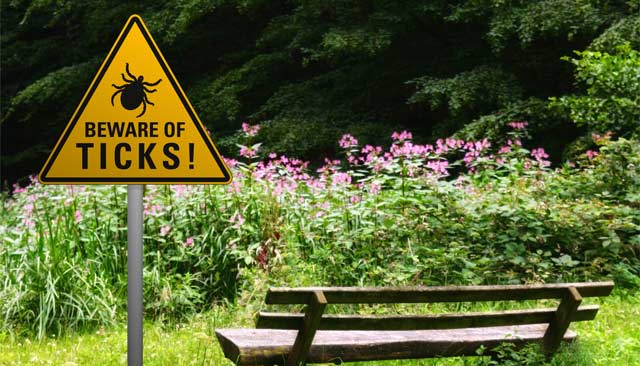
Yellow fever is found in South America and Africa. A serious disease spread by mosquito bites, it can cause fever, flu-like symptoms, jaundice (yellow skin/eyes), bleeding, and even organ failure and death. If traveling to risky areas, have a yellow fever vaccine before traveling; proof of vaccination may be required to enter certain countries. Also, see the below advice to prevent mosquito bites.
Dengue fever: This viral disease is also spread by mosquito bites. It’s common in Southeast Asia and Pacific islands, and in the Caribbean and Latin America. Symptoms include fever, severe headache, muscle/joint pain, and rash. There is no vaccine – avoid it by using insect repellent, wearing long-sleeved shirts and long pants, and treating clothing and gear with permethrin, which kills mosquitoes on contact. Keep doors and windows closed, use mosquito netting, and avoid areas with standing water, especially at dawn or dusk.
Zika virus: Also spread by mosquito bites, the Zika virus can cause Guillain-Barré syndrome and severe birth defects if pregnant women contract it. Check the Centers for Disease Control and Prevention website for Zika travel information. Follow the advice above to avoid mosquitos.
Malaria: Also spread through mosquito bites, malaria is common in tropical/subtropical areas. Start taking malaria-prevention tablets a week or two before travel. Ask your doctor to recommend the right medication, especially if you are pregnant or take other medications. Follow the advice to avoid mosquito bites.
Norovirus is highly contagious and common on cruise ships. To avoid it, wash your hands often with soap and warm water, and/or use hand sanitizer, especially after touching shared bathroom fixtures, doorknobs, and handrails. Avoid the buffet or food that’s been sitting out.
Flu: Receive the latest flu vaccine before your vacation, and practice good sanitation habits, as described above for avoiding Norovirus. See your doctor for an antiviral drug prescription you can take if symptoms start.
Diarrhea: Traveler’s diarrhea is caused by bacteria in food and water. High-risk destinations are Asia, the Middle East, Africa, Mexico, and Central and South America. Non-pregnant adults can reduce their risk by taking two Pepto-Bismol tablets four times a day. Drink bottled water; avoid drinking tap water, well water, or unpasteurized milk. Practice good sanitation habits.
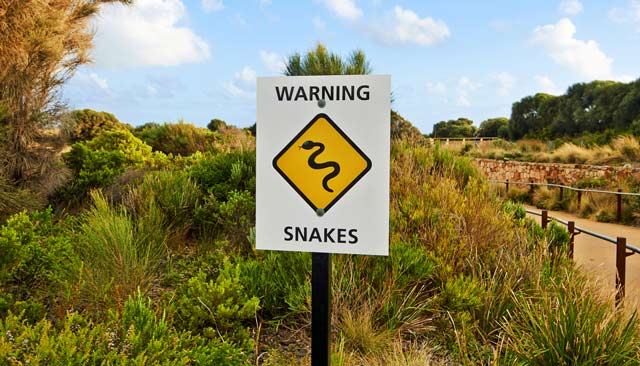
Dangerous Wildlife
Besides insects, other forms of wildlife can ruin your vacation. To avoid vacation hazards, you need to avoid spiders, snakes, sharks, jellyfish, black bears, and other dangerous animals. Research wildlife you may encounter where you’re going; learn local laws and regulations to avoid contact and injury. Many parks have food storage requirements to protect bears and humans. Know and follow the requirements and recommendations.
Spider and snake bites can also be dangerous. Shake out your sleeping bags, gloves, and shoes before using them. Wear thick hiking boots and long pants when walking in tall shrubs and long grass. Insect repellent with DEET is also effective for spiders.
In general, keep your distance from all wild animals, even if they look cute and friendly. Animals are unpredictable, and even small animals can be dangerous.

Crime or Political Unrest
Vacationers are frequent crime victims, and this can be especially traumatic when you are unfamiliar with the laws and customs. To avoid the vacation hazard of being a crime victim:
- Stay aware of your surroundings
- Don’t drink to excess
- Keep an eye on your drink
- Don’t drive if you’ve been drinking
- Keep your cash, credit cards, passport, and wallet safe
- Contact your credit card company before you travel so your card is not suspended for suspected fraud
Before traveling abroad, check the U.S. Department of State’s Travel Advisories. If your destination is high-risk, follow these recommendations. Even if your destination is listed as safe, enroll in the Smart Traveler Enrollment Program (STEP).
When traveling out of the country, know that you are subject to the laws where you’re visiting. The State Department may be unable to help if you break the law, so know what you legally can and cannot do in your destination country. Go to this site for more information on victim services and victim assistance for U.S. citizens traveling overseas.
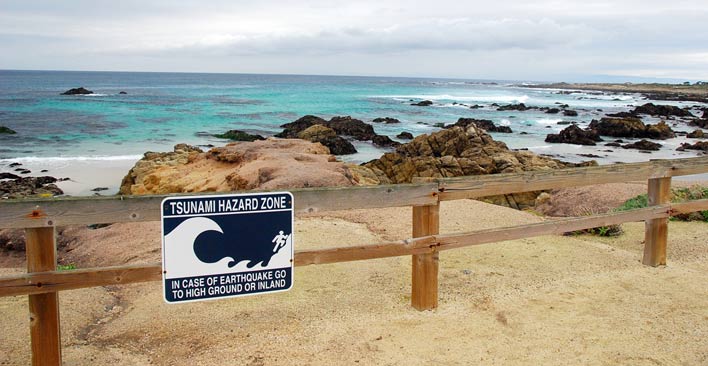
Extreme weather or natural disasters
Check whether any extreme weather is common in your destination for the time you’ll be visiting. Understand the types of natural disasters that may occur there, and have a plan for what to do if something happens.
If your injury is due to unsanitary conditions at a hotel, restaurant or cruise ship, or caused by negligent security or poor emergency services, call TorkLaw. Our personal injury attorneys are experienced in obtaining injury and crime victims compensation for their losses.
We hope you’re able to avoid vacation hazards and don’t need to contact us this summer. But know that TorkLaw is here for you if needed.
In the summer, whether on vacation or sticking close to home, people across the United States tend to be more active, go more places and try new things. Here’s how to avoid some common summertime hazards.
During the summertime, we see more injuries from amusement park accidents, transportation accidents like helicopter accidents, bicycle accidents, and cruise and passenger ship injuries. There are also more injuries from extreme sports and other activities.
Summertime Sports Injuries
When having fun, be safety-conscious and know your limits:
- Always use the appropriate safety gear. Have you noticed that professional athletes always use safety gear, such as helmets, gloves, correct shoes, shin and shoulder pads, etc.? They do that to prevent injury, so they can take the field again for the next game. “Weekend warriors” should follow their lead and suit up to prevent contact sports injuries so you can keep enjoying your summer.
- Remember to warm up and cool down by doing some stretches to prevent common sports injuries like muscle and ligament tears, sprains, strains or stress fractures.
- Stay hydrated, preferably with water, although sports drinks are also a good source of electrolytes if needed. Stay away from alcohol until the game or activity is over! Playing sports or performing other activities while drunk is an invitation to injury.
- Don’t do anything that makes you uncomfortable. Sure, it might be embarrassing to beg off from skydiving or bungee-jumping just because you have a bad feeling about the instructor or safety harness. But given the choice between embarrassment and the alternative, if you’re right, it’s probably worth a little ribbing at the bar later.
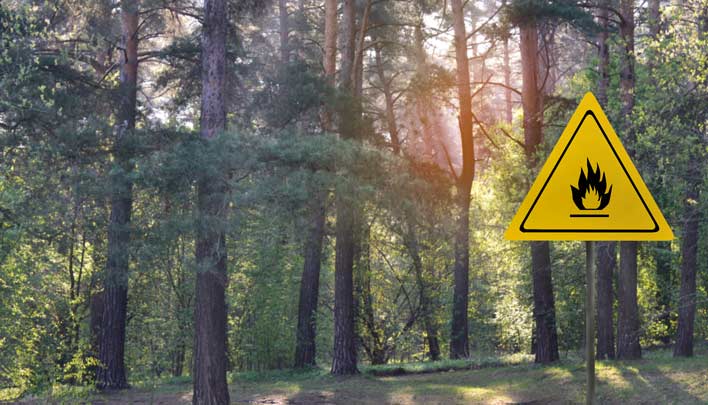
Camping Safety
In the Research Your Destination section, we covered insects and animals. Camping presents other summertime hazards. If you’re taking a camping trip this summer, you should definitely read up on that. Other camping safety tips:
Choose your campsite based on your camping skills. If you’re a novice, consider a cabin or renting an RV, where you’ll have beds and access to running water. If you have a little experience with tent camping, you may want to reserve a site on a campground where you can pitch a tent but still have access to toilets, showers, and other amenities. Keep safety in mind when making your choice.
Check the weather so you know what to expect. Pack accordingly – if you’re going to an area where it will be mostly sunny, be sure to bring protective clothing, hats, and sunscreen. If it will get cold at night, bring lots of layers so you can bundle up. If you expect rain, bring waterproof gear.
Remember, only you can prevent forest fires; or fires in any location, for that matter. Only light fires in designated areas. Don’t light a fire within 15 feet of anything flammable, including tents, shrubs or trees. Dig a fire pit, or create one with large rocks. Keep a large bucket of water nearby, and douse your fire before you go to sleep. Never leave a fire unattended.
Don’t leave food out or unattended. To keep from attracting animals, and also to keep your food free of bacteria, store it in airtight, waterproof containers. Find out what the food storage requirements are for where you’re going, and make sure you follow them.
Stay hydrated, don’t drink alcohol to excess, and see the section below on sun safety.
Pack a first aid kit for summertime hazards, containing:
- Bandages – both adhesive and gauze & tape
- Antibiotic ointment or cream
- Alcohol or other antiseptic
- Environmental Protection Agency (EPA)- recommended insect repellent
- Ibuprofen, acetaminophen or NSAIDs for inflammation or pain relief.
- Benadryl for allergic reactions, or an EpiPen for those with extreme allergies
- Cortisone cream for rashes or insect bites
- Cold packs/compresses
- Heat packs
- Emergency blanket
- Sunscreen
- Whistles
- Cell phone chargers
Sun Damage
Sunburn is one of the most common summertime hazards. Most sunburns are first-degree or superficial burns; however, they can cause lasting skin damage and increase your risk of skin cancer. Young children especially should be protected from sunburn.
Whenever spending time in the daylight, even when cloudy, wear sunscreen with a sun protection factor (SPF) of 30 or above. Sunscreen only protects for so long, so after a couple of hours, go inside, seek shade, or cover up with long sleeves and pants. Wear a wide-brimmed hat and UVA-UVB sunglasses to protect your head, neck, and eyes.
To avoid heat stroke or heat exhaustion, try not to overexert yourself for an extended time in high temperatures. Take frequent breaks inside or in the shade, and drink plenty of water.
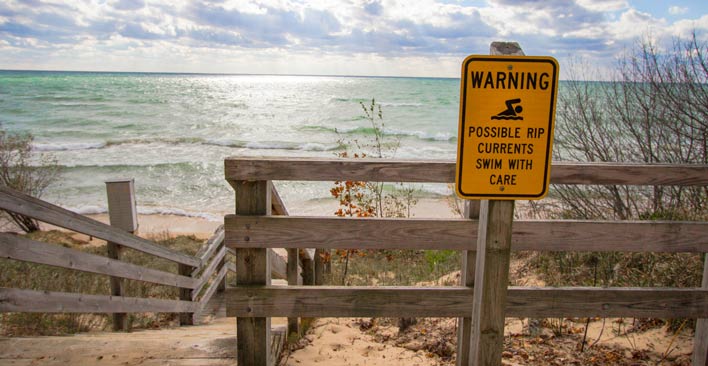
Water Safety
More people in the water means more summertime hazards resulting in recreational boat and personal watercraft injuries and drownings. Each year, about ten people per day die from drowning in the U.S. Even nonfatal drowning injuries can cause long-term disabilities.
Drowning can happen anywhere – oceans, lakes, ponds, and swimming pools. Many U.S. beaches post warnings about water conditions – pay attention, and follow the recommendations. Otherwise, use common sense. Watch what the locals are doing, or ask them how the water is. Unless you’re confident in your swimming skills, stay in areas monitored by lifeguards. Also be aware of dangerous ocean life, such as sharks, stingrays, or jellyfish.
One ocean danger is a rip current, a long, narrow band of rapidly-moving water that may pull swimmers away from shore. When caught in one, the instinct is to swim to shore – however, even the strongest swimmers cannot fight a rip current.
Instead, remain calm: a rip current will not pull you under. Focus on keeping your head above water. Summon help if you can, and either swim or float parallel to the shore. Conserve your energy until the current weakens and you’re able to break through and swim back to the shore.
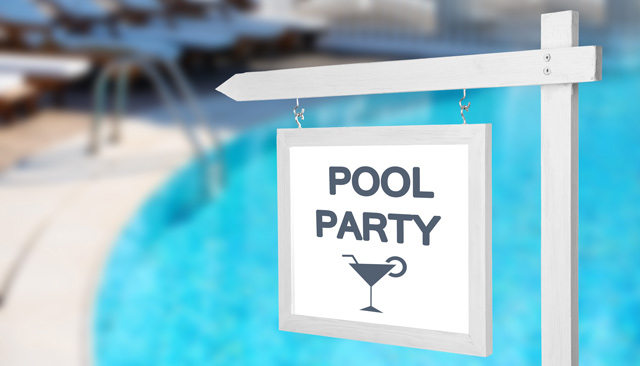
To keep your family safe in the water or by the pool, follow these water safety tips:
- When swimming in a body of water, check the water depth before diving.
- Make sure pool fences are at least 4 feet high, with a latching/locking gate.
- Make sure pool ladders are secure.
- Instruct kids and young teens to never swim alone.
- Provide certified life jackets vs. inflatables for non-swimmers.
- Keep toddlers within arm’s length of adults when swimming.
- Have a swim monitor watch kids whenever they’re in the water.
- Never swim under the influence of alcohol or drugs.
- Put the pool toys away after swimming to remove temptation.
- Learn CPR.
- Know the signs of drowning/water distress, and act if you see a swimmer that is:
- Silent, with their mouth at water level
- Gasping or hyperventilating
- Upright in the water with head tilted back
- Moving downward or holding arms out to the sides
- Bobbing or trying to swim but not making progress
- Glassy-eyed
- Floating face down
This summer, if you are an injury victim due to another person’s actions or negligence, you may be entitled to recover damages. If your injury is due to premises liability, such as an unsafe condition, poor safety training or procedures at an amusement park or activity, or negligent security at a hotel or public pool, call TorkLaw. Our personal injury attorneys are experienced in obtaining compensation for injury victims.
Whatever you do this summer, be safe and have fun. We hope you have no need of a personal injury lawyer – but if you do, TorkLaw is here for you!
Many people in the United States will be traveling this summer, whether it’s a full week (or multiple weeks) vacation or a long weekend trip. Travel risks are part of the vacation experience. Transportation accidents can happen anywhere, and our practice areas section has information on dealing with many accidents that can occur while going from one place to another. Below are some additional ways to avoid vacation hazards that can happen while traveling.
Airplane Hazards
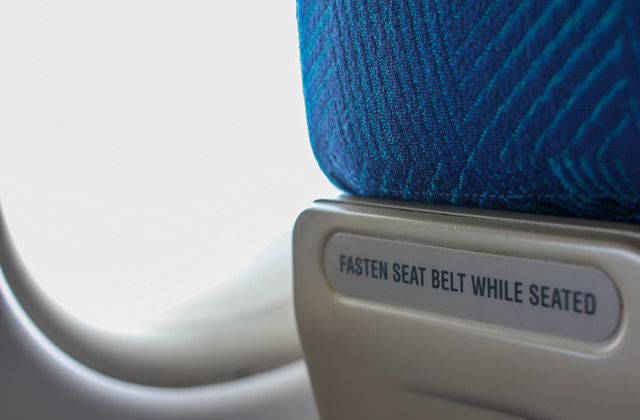
We’ve detailed travel risks and advice for dealing with airplane accidents and aviation safety in our practice areas section. Other airplane hazards are deep-vein thrombosis (DVT), and sleep disturbance, or jet lag.
DVT happens when a blood clot forms in a vein, such as in one of your legs, sometimes caused by sitting for an extended time. These clots can travel through your bloodstream and cause a life-threatening condition known as pulmonary embolism (PE).
To avoid DVT when flying, move around as often as possible during the flight, and avoid crossing your legs. Stay hydrated and avoid alcohol. While you’re sitting, do some leg exercises to keep them active. If you’re at risk for blood clots, talk to your doctor before traveling.
To avoid jet lag, try to adjust your sleep schedule to your destination before your trip. If your flight happens when you’d be asleep in your destination, try to sleep on your flight. Be sure you dress comfortably, and bring a travel pillow and sleep mask. Use earplugs or listen to a white, pink or brown noise app. You may want to take melatonin beforehand. If you’d normally be awake, avoid sleeping on your flight by drinking coffee, watching a movie or reading a book.
Once you arrive, adjust your schedule to the sun. If it’s dark when you arrive, go to sleep (see above tips). If it’s light, stay awake. Spend at least 30 minutes in the sun to release melatonin, and synchronize your body’s circadian rhythm.
Lodging Risks
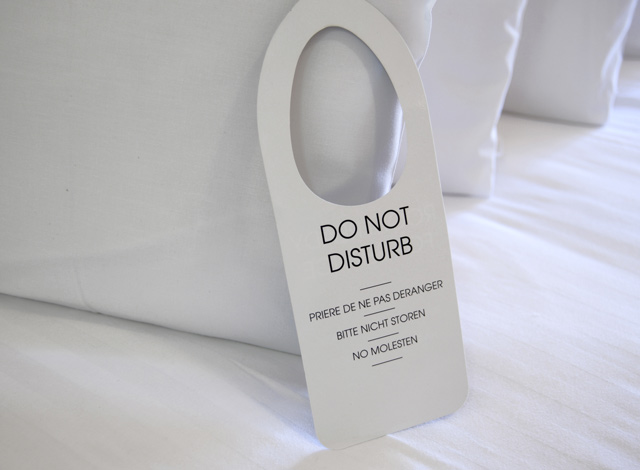
When traveling away from home, and renting an Airbnb or similar lodging, read our Ultimate Guide to Airbnb Accidents.
When staying at a hotel or resort, be aware of common hazards like slip and fall accidents and negligent security. Food poisoning (and Norovirus) can also be a problem, as can bed bugs.
To avoid food poisoning, make sure meat is thoroughly cooked and hot when served. Watch for signs of poor food hygiene. Avoid buffets, which can attract bacteria. Wash your hands before eating.
Also, when you sleep at night, don’t let the bedbugs bite. To avoid bed bug bites, pack your clothes in giant sealable bags. You can also purchase plastic suitcase covers. If you’re staying in the U.S., you can check The Bedbug Registry for bed bug infestations your hotel.
Upon arrival, do a visual inspection. Bed bug droppings look like tiny ink blots. Search for bed bugs hiding in the bedsheets, pillowcases, mattress seams, and cracks and crevices in the mattresses and box springs. If you find an infested area or itchy welts on your body after staying the night, find another place to stay.
If your room seems pest-free, you should still take care. Keep foldable clothes in suitcases/plastic bags. Keep suitcases off the floor. Don’t drape clothes on the furniture. You can purchase non-toxic bed bug repellent to bring along for extra assurance. When you arrive home, wash all clothes in hot water and vacuum your luggage to prevent travel risks link bringing unwanted pests home.
Emergency Medical Services
Becoming ill or injured in another country or even state is a serious travel risk, because emergency medical services (EMS) may be hours away, unreliable, or not covered by medical insurance.
Before traveling, research available EMS systems in your destination location. Ask your medical insurance company about options for supplemental travel insurance.
Heart Attacks
Believe it or not, the single most common vacation-related cause of death for Americans is heart attacks.
While the purpose of taking a vacation is to take a break, vacation risks that create a great deal of stress include flight delays, lost luggage, reservation snafus, rental car accidents, etc. A cardiac event is one of the potential effects of stress.
The best way to avoid a heart attack or other stress-related incident while on vacation is good planning. Don’t put packing off until the last minute; get everything ready at least the day before. Also, make a packing checklist so you don’t forget anything important, like prescription medications or your cell phone. By the way, be sure to keep those items in your carry-on bag, in case your luggage is lost.
If you are on medication for existing health problems such as high blood pressure, changing time zones can interfere with your prescribed schedule; but do your best to stay on track and not skip any dosages.Stay hydrated. Air travel can be very dehydrating, which can negatively impact your mood and general health, so keep drinking water.
Eat regularly, and try to maintain a healthy overall diet. While it’s fine to enjoy your food while on vacation, also be health care conscious. Do your best to maintain a balance of fresh fruits and vegetables, healthy proteins, and whole grains, along with rich, sugary, or high-fat foods we all often eat when traveling.

Finally, do your best to care for your mental health by maintaining a balanced perspective. Even if you’ve planned everything perfectly, life still happens. If you’re late to the airport, most airlines will work with you to reschedule your flight, even if you have to pay a small fee. Flights are delayed for many reasons, some of which are for our own safety. Lost luggage is usually located, and airlines will deliver it to you, so as long as you have your necessities in your carry-on, you’ll live.
As long as you and your family are safe, nothing is worth a cardiac event. Practice some stress management. Take some deep breaths, do what you can to resolve the situation, and think of it as an adventure – or at least, a great story to tell your friends later.
If you are injured while traveling due to someone else’s carelessness or deliberate action, you may be entitled to significant compensation.
If your injury is due to premises liability, such as an unsafe condition at a rental property, hotel, or cruise ship – or a transportation accident caused by another party, such as an airplane, train or bus accident, call TorkLaw. Our personal injury attorneys are experienced in helping victims of travel risks to recover, both physically and financially.
We hope your summer is fantastic, injury-free! TorkLaw is here for you in all seasons – 365 days a year, 7 days a week, 24 hours a day.


